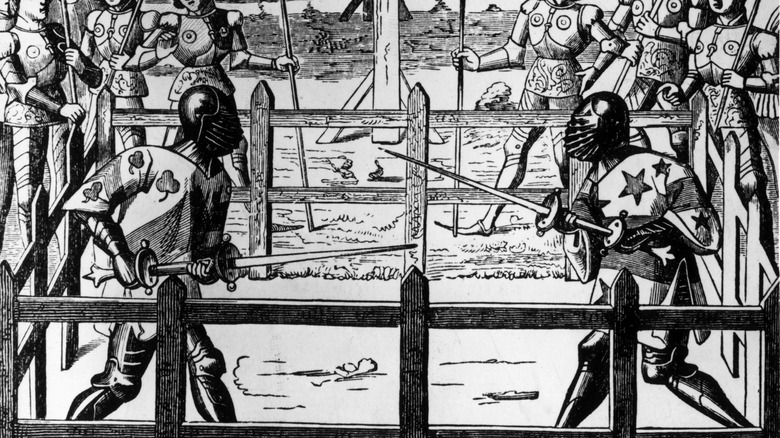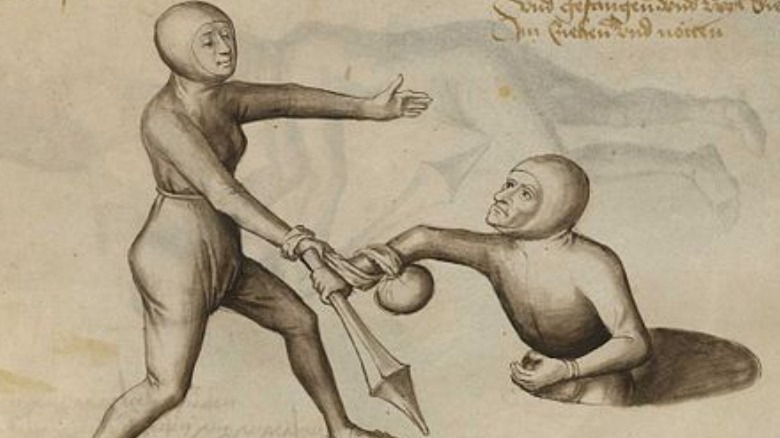Some Divorces In The Middle Ages Were Handled In An Unusually Violent Way
In the Middle Ages, beginning with the fall of Ancient Rome in A.D. 476 to the Renaissance in the 14th century, some aspects of the judicial system resembled what we have today. There were juries who determined whether a victim was innocent or guilty, based on the ideals of "justice" found in the early writings of Plato's "The Republic" (per Medievalists.net).
But there were certainly plenty of differences. The convicted were often put to other physical tests to determine if they were innocent or guilty. According to BBC News, the accused would sometimes be forced to "carry a red-hot bar of iron" nine feet, and if after a few days their searing blisters healed up without infection, God was on their side and they were innocent. Sometimes, they were thrown in water and if they sank, it was thought God was accepting them and they were declared innocent, whereas if they floated they were found guilty (per Harvard Law Today).
Trial by combat was a popular way to determine a sentence. According to BBC News, "God would grant the moral-victor the strength to vanquish the person who wronged them."
Divorce in the Middle Ages
As far as the legal aspects of marriage, people in medieval times weren't exactly legally separated and able to happily return to being single. The term "divorce" was not used in the Middle Ages, but "married people found [other] ways out of many unworkable unions, from having a marriage annulled to gaining a civil separation to simply abandoning one's spouse and starting over," according to a review of Sara Butler's book "Divorce in Medieval England: From One to Two Persons in Law," by Marie Kelleher.
However, women risked being ostracized by their community and society by separating from their partner, as well as facing felony crimes and domestic violence backlash from their husbands who wanted to stay together, according to Butler. (Men were usually held at no fault for separating from their partners.) However, if women were prosecuted in court, they were typically not permitted to participate in trial by combat, electing instead one nobleman to do the heavy lifting for her, according to History of Yesterday.
In France, there was one way a woman could separate from her husband: If she accurately accused him of being impotent (per The Paris Review). Although this was one of the only loopholes a woman could use to separate from her husband, it should come as no surprise that it wasn't easy for them. Both husband and wife were subject to physical examinations in the trial, and one can imagine the marriage must have been pretty bad for a woman to have to go through that.
The marital brawl
There was one exception to the female-exclusion of trial by combat. According to Cracked, the practice was described in a 1467 dueling manual by Hans Talhoffer. Husbands and wives were allowed to fight one another in marital brawls to settle disputes. Both parties wore "a tight-fitting bodysuit with a hood," but men were given certain restrictions so as not to overpower women, per History of Yesterday. For example, the man fought with a club from a dredged hole such that only his torso was above ground, whereas the woman was equipped with a sort of long sock stuffed with stones with which to beat him (via Cracked). Nor was the man allowed to touch the sides of the hole as he engaged in combat. He was allowed three weapons, but had to sacrifice one each time he made contact with the sides of the hole. Eventually he could end up disarmed entirely.
According to Cracked, the duels themselves didn't often end in death, but rather concluded when one party ceded. That wasn't the end, however; the loser would be killed in the town square if it was the husband, or buried alive if it was the wife (via Cracked). Even though the battle and its repercussions don't seem quite fair, "the rules of the marital duels did seem to work in the woman's favor," per Cracked, and we have "several recorded occasions of a scorned wife towel-flicking her terrible husband into submission."


